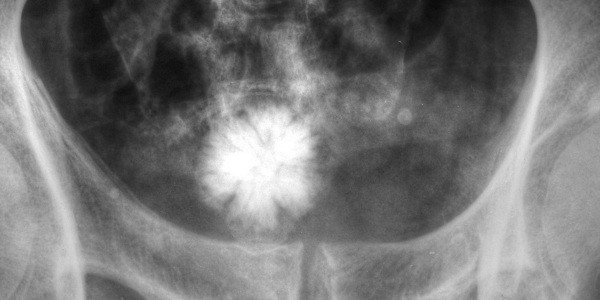Bladder stones

Bladder stones are hard mineral masses localized in the bladder.
These formations form when the urine in the bladder is too concentrated, causing the minerals in it to crystallize.
Concentration is often the result of an inability to empty the bladder.
The formations do not lead to the appearance of clinical manifestations and can be detected during investigations for other problems. When symptoms do occur, they can range from abdominal pain to blood in the urine.
Small stones are sometimes passed out in the urine on their own, but may need to be removed by a doctor. If left untreated, growths in the bladder can cause infections and other complications.
What are the symptoms?
Some of those affected have no complaints, even when the stones are large.
But if the formation irritates the bladder wall or blocks the flow of urine, clinical manifestations occur, most often consisting of:
• Pain in the lower abdomen;
• In men, pain and discomfort in the penis;
• Painful urination;
• Increased frequency of urination;
• Difficulty passing urine or sudden stoppage of the flow of urine;
• Blood in the urine;
• Cloudy or unusually dark urine;
What are the causes?
Stones usually form due to incomplete emptying of the bladder.
Urine that is left in the bladder can form crystals which eventually form stones. In most cases, another disease affects the ability to completely empty the bladder.
The diseases that most often cause the formation of stones in the bladder are:
• Enlargement of the prostate gland, as the urethra is compressed and it is possible to interrupt the flow of urine, which causes some of it to remain in the bladder;
• Damaged nerves / neurogenic bladder / – usually through the nerves, signals are sent from the brain to the muscles of the bladder to retain or release its contents.
But when these nerves are damaged by a stroke, spinal injury or another health problem, the bladder is unable to fully empty its contents.
Other conditions that are among the likely causes of mineral formations in the bladder:
• Inflammation – urinary tract infections and radiation therapy to the pelvic area may cause inflammation of the bladder.
• Medical devices – sometimes a catheter placed to drain urine from the bladder can cause stones to form.
• Kidney stones – sometimes smaller kidney stones can break off and travel down the ureters and reach the bladder.
Treatment of bladder stones
Medical removal of the stones is usually required. However, if they are small, doctors recommend drinking large amounts of water over 3 liters per day so that it is possible to eliminate them through urine.
However, since stones are most often the result of an inability to completely empty the bladder, spontaneous passage of stones is unlikely.
In almost all cases, it is necessary to remove the mineral formations.
Most commonly, stones are removed using a procedure called cystolitholaxy.
A small tube with a camera at the end /cystoscope/, which allows good visibility of the stone.
The doctor then uses a laser, ultrasound, or a mechanical device to break it up into small pieces, and then the bladder is flushed and the mineral deposits are removed.



